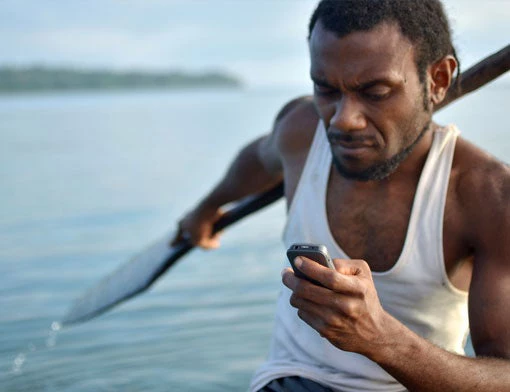
I must admit to being notoriously bad with a mobile phone. I forget to take it with me, leave it in parks and cafés and have never migrated to a smart phone – a simple old Nokia handset is my trusty aide. And on my part this has probably contributed to some skepticism about the discussion of development and mobile phones – which can sometimes seem a little evangelical.
But earlier this year, I set out to talk to Pacific Islanders to find out how they see the impact of increased connectivity in their countries, which in the last few years have experienced some spectacular rises in mobile phone access and coverage.
Through these conversations, I realized that in the Pacific, connectivity means a lot more than I could have imagined. For this is a part of the world where populations are, quite literally, dispersed across hundreds of islands and vast distances of ocean, with rural communities often located many days away from towns and services.
Take the island republic of Vanuatu in the South Pacific. Before mobile phones, farmers told me how, barefoot, they’d haul heavy bags of kava along beaten rural paths for days, in the hope of picking up a ship to the capital, Port Vila. Not knowing exactly what day the boats were due or if there’d be room to board, they’d sit and wait. If the ships were full, that would be it. Their kava, which takes months to grow, was wasted; that critical income lost.
Today, they pick up a phone, they make a phone call, and they know when and if the ship will come. This saves them days of walking, days of waiting, and ensures they get access to the market to sell their goods.
This is a narrative we hear again and again in the rural communities, which are home to 80 percent of the country’s population.
In Malekula, I talked to Noelene Kesup, the Matron of Norsup Hospital, who spoke vividly of some of the very real challenges faced by resource-strained medical staff in the Outer Islands. With mobile phones, she tells me, the staff can reach doctors and specialists in the event of an emergency to get urgent advice–mostly when women suffer complications during childbirth. Mobile phones are helping health workers collect data, and allow patients to get information and reach health centers when they need care.
The use of mobile phones to improve service delivery has a lot of potential in the region, and now this technology is starting to be explored in relation to disaster management. Vanuatu’s National Disaster Management Office, for example, has been piloting a low-tech emergency system that sends free SMS alerts to community representatives in areas that may be affected by a cyclone, tsunami or other disaster. The alerts give information about the size, scale and likely impact time, and what steps communities need to take to prepare.
“We know that in the past, people generally only listened to the radio in the morning or the early evening,” explained Shadrack Welegtabit, the Director of the Vanuatu National Disaster Management Office. “But a disaster or an emergency can happen at any time. By going to SMS we know that regardless of the time of day, people will still get the message.”
For Vanuatu’s many fishing communities, mobile phones not only link fishers to markets, but can also provide a lifeline in the event of storms or other potentially catastrophic events.
“Now, every time I go fishing, I know I must take my phone,” said Kelan Sing, a subsistence fisher from the village of Taremb. “Sometimes I will lose my paddle. Now I can get my phone and call someone on the shore to come and help me.”
These SMS alerts are one of several disaster response initiatives that have come about as a result of the dramatic scale up in ICT access–the product of a series of government-led telecommunications reforms over the last six years. These reforms saw the end of a decade-long monopoly that meant that only 6% of the country had mobile coverage. Just six years later, 92% of Vanuatu has mobile coverage, and 99% of the population have at least one mobile phone in their household. It has been an extraordinarily fast turnaround.
Despite initial concerns that the incumbent operator would lose out, it too has benefitted financially from the extraordinary increases in coverage seen in Vanuatu.
Of course mobile phones are not a panacea for development. We all know that there is no such thing. But in the Pacific, ICT connectivity – mobile phones and now, internet – has a remarkable role to play in connecting people across islands, and to each other.
You can see some of these stories here.
Do you have other examples of how the arrival of mobile phones have made lives easier for rural communities? I’d be interested to hear your stories.


Join the Conversation